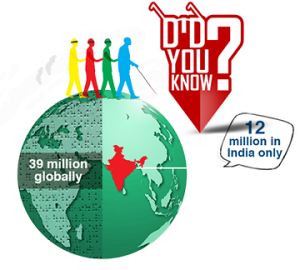
Blindness can be due to several causes. These may be:
- Refractive errors
- Cataract
- Glaucoma
- Retinal changes in Diabetic Retinopathy
- Age Related Macular Degeneration ( ARMD)
- Corneal Blindness.
- Xerophthalmia (Vit A deficiency)
Corneal blindness occurs because of damage to the cornea due to nutritional deficiency, injury due to accidents, and diseases or infections like trachoma, conjunctivitis and smallpox. The normally transparent cornea becomes opaque thus preventing the light from entering the eye causing total or partial blindness. Out of the total estimated 2.5 million corneal blind people at least half of them can gain vision by the means of proper corneal transplant. The new cornea to be transplanted cannot be artificially created and has to come from a human body. It comes from a dead body ONLY.
Consent Is Required
Although the health of an individual is the responsibility of the state government, recently the Central Government has enacted the “TRANSPLANTATION OF HUMAN ORGANS ACT 1994”. The removal of eyes for therapeutic purposes has been defined under this act. This act applies to all the states and all union territories.
It permits the removal of corneas after the death of a person either with written consent of the donor (while he is alive) or after obtaining the necessary authority from the person who is lawfully in the possession of the dead body of the donor. The identity of the donor is not revealed and to avoid commercial misuse of the corneas they are provided free of cost for transplantation.
How To Donate Eyes? For Donors
-
- To apply for an eye donation, fill up an easy form available at any of the GANGAR EYENATION’s stores. You can also download the form by clicking on the adjoining link.
- Or, write to your nearest eye bank & register your wish to donate eyes.
- If the eye bank sends you a registration card, display too prominently so that it will serve as a long-term reminder.
- Discuss very often your intention to donate eyes with your family, friends, & family physician.
For Donor’s Relatives:
If you have a moral responsibility or authority to donate the eyes of the deceased then:
- Get the death certificate quickly.
- Contact the nearest eye bank or DIAL 1919.
- Close the eyelids.
- Place small packs of ice over the closed lids.
- Switch off the fans.
- Raise the donor’s head by at least 6 inches by putting two pillows below the head.




